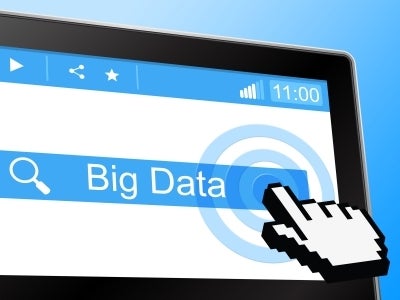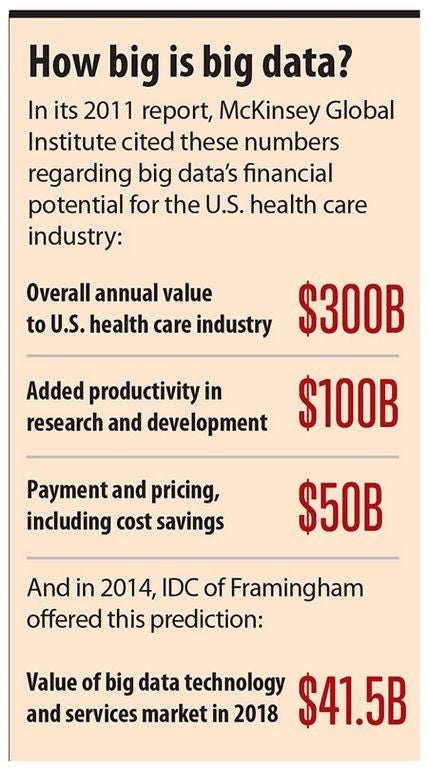'Big data' becomes bigger deal in business, college
Big data represents a more nebulous and far-flung term than “innovation economy.” At its core, the term encompasses the ability to collect data and make sense of huge chunks of raw information.
Yet big data is also becoming important for businesses in optimizing profits and planning the future. That’s why companies large and small will employ about 500,000 people by 2018 whose jobs will be connected to big data, according to McKinsey Global Institute, which published a seminal study on big data in 2011.
Every second, billions of bits of information are being created. Whether it’s demographic data or information about what kind of weed killer is flying off a store’s shelves, being able to take that information, make sense of it and transform that newfound knowledge into profit is becoming easier for a small business to accomplish, according to Fielder Hiss, vice president of marketing and product management at Enernoc, a Boston-based provider of energy intelligence software with operations in Worcester.
“Big data has really exploded in the past five years or so,” he said. “Big companies have been doing things with big data for a long time, but the technology has really come a long way.”
The ability to use all that data has become more ubiquitous, thanks in large part to cloud-based computing, said Sumit Verma, partner and vice president at ten24, in Worcester. Verma’s company designs software that allows companies to tap into their data more effectively. In years past, companies would have had to invest tens of thousands of dollars in computer infrastructure that would become obsolete in four years. But today, using cloud-based data services allows even smaller companies to crunch numbers.
“It empowers companies to use that data to become more effective and become more profitable,” he said. “The whole idea is how you use that data to find the trends that allow you to become more profitable.”
Ten24 is part of a growing trend of smaller technology companies that allow businesses of all sizes to tap into their own data or what’s available in public databases. In the case of Scientific American Magazine, using a ten24 program to analyze online sales data helped it change the checkout process and boost sales 16 percent, Verma said.
“It’s like finding a needle in the haystack. What we built for them is a magnet,” Verma said of pulling out useful information from piles of data.
Nonprofits are also making use of data to make their case when they apply for grants and to evaluate the effectiveness of their programs, Christopher O’Keeffe, a vice president at the Greater Worcester Community Foundation, said. Education and health data have been the most widely available, and have allowed nonprofit agencies within those fields to make more educated plans and cases for their programs, he said.
Building a 'big' database
The foundation has undertaken a project to bring the power of big data to Central Massachusetts nonprofits by creating the Central Mass DataCommon database. Initially, this database will be an amalgam of nearly 300 data points from mostly government sources, but over time local nonprofits and businesses will be encouraged to add their own information.
“Nonprofits need to understand their work better in order to become more effective and they also need to demonstrate it … Small organizations will be able to prove their case where they did not before,” O’Keeffe said of the program, which is in beta testing.
While only the largest nonprofits and businesses will ever have dedicated teams analyzing big data, this database will allow smaller nonprofits to tap into the analytical world. But even the best database and software are useless without people to manage it, said Feyzi Bagirov, founding director of the new data science program at Becker College.
“No matter how big your data is, it is useless unless you can extract an insight out of it to make a decision,” he said, explaining that it requires programming skills, statistical understanding and the ability to work within a group.
Computer science and statistics
The Becker program will be one of close to 20 undergraduate programs in the country that educate specifically for big data. The program will incorporate computer science learning with a statistical bent, using real-world scenarios and big data tools, Bagirov said.
Up until this point, said Hiss, many companies have relied on people without formal training in “big data” analytics. They have come from the worlds of banking and health care with a passion for data. But as the field becomes more established, people with more specific skill sets will be in high demand.
“You are seeing a lot more data jobs emerge and they are very high in demand,” Hiss said. “We are going to be looking to hire people with more formalized data education.”
Whether it’s current students looking for job opportunities, schools looking for new educational opportunities or companies looking to optimize their profits and efficiency, big data can be a way forward. According to Verma, once ten24’s clients see how much more efficiently and effectively data can be analyzed using modern methods, they realize how working exclusively with Excel spreadsheets is outdated compared with using their own computing power.
“When we come across all these clients, we talk to them and say they are living in the past,” Verma said of companies that don’t analyze information from a “big data” mindset.
















0 Comments